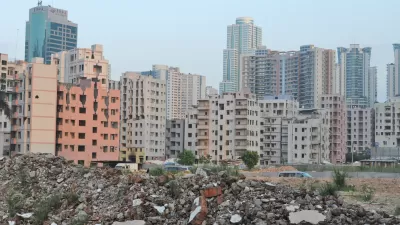Minneapolis is, by many accounts, home to a thriving economy. Why then, are there so many vacant properties in the city?
"Nearly 340 residential buildings sit empty and boarded across Minneapolis, despite a severe housing shortage and a steep vacant property fee that has raised $20 million for city services over the past decade," reports Andy Mannix.
The number of vacant properties has declined by half since the height of the Great Recession and Foreclosure Crisis, according to Mannix, but the remaining vacancies are proving particularly obstinate.
According to Mannix, the persistence of these vacant properties works contrary to every manner of market pressure. The city charges the owners of vacant properties $7,000 a year in fees, the housing market is tighter than it's been in decades, and the foreclosure rate in Minneapolis is one of the lowest in the country.
The article explores, in a lot more detail, why vacant property owners keep paying the fee, what services the fee pays for, and why the city is motivated to improve vacant properties.
FULL STORY: Minneapolis still battling against vacant properties -- even in housing shortage

Planetizen Federal Action Tracker
A weekly monitor of how Trump’s orders and actions are impacting planners and planning in America.

Restaurant Patios Were a Pandemic Win — Why Were They so Hard to Keep?
Social distancing requirements and changes in travel patterns prompted cities to pilot new uses for street and sidewalk space. Then it got complicated.

Map: Where Senate Republicans Want to Sell Your Public Lands
For public land advocates, the Senate Republicans’ proposal to sell millions of acres of public land in the West is “the biggest fight of their careers.”

Maui's Vacation Rental Debate Turns Ugly
Verbal attacks, misinformation campaigns and fistfights plague a high-stakes debate to convert thousands of vacation rentals into long-term housing.

San Francisco Suspends Traffic Calming Amidst Record Deaths
Citing “a challenging fiscal landscape,” the city will cease the program on the heels of 42 traffic deaths, including 24 pedestrians.

California Homeless Arrests, Citations Spike After Ruling
An investigation reveals that anti-homeless actions increased up to 500% after Grants Pass v. Johnson — even in cities claiming no policy change.
Urban Design for Planners 1: Software Tools
This six-course series explores essential urban design concepts using open source software and equips planners with the tools they need to participate fully in the urban design process.
Planning for Universal Design
Learn the tools for implementing Universal Design in planning regulations.
Heyer Gruel & Associates PA
JM Goldson LLC
Custer County Colorado
City of Camden Redevelopment Agency
City of Astoria
Transportation Research & Education Center (TREC) at Portland State University
Camden Redevelopment Agency
City of Claremont
Municipality of Princeton (NJ)




























